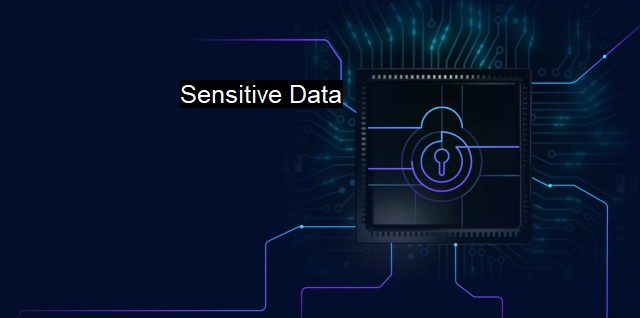What is Sensitive Data?
Cybersecurity Strategies for Safeguarding Sensitive Data: Protecting from Vulnerabilities, Breaches, and Attacks
Sensitive data refers to the type of information that is highly guarded, as it contains highly confidential or private information. This can mean anything from medical histories, banking information, intellectual property, trade secrets, and personal identifying information, like social security numbers, addresses, and birthdates. Sensitive data can cause devastating consequences if lost, stolen, or leaked, leading to identity theft, fraud, reputational damage, data misuse, and much more.As technology flourishes, people and companies store and transmit sensitive data online. Though this brings comprehensive ease, it also brings disgruntled challenges, such as data breaches and cyberattacks. Hackers can use a vulnerability to gain unauthorized access to this data, destroy it or utilize it maliciously. As a result, it has become imperative to protect such sensitive information from unscrupulous elements, vulnerable exposures, risky applications, and signals while using trustworthy cybersecurity solutions to stay cyber resolute.
Antivirus software is one of the most commonly applied cybersecurity measures for safeguarding sensitive data. Antivirus software prevents, detects, and removes malicious software, malware infections, web attacks, and computer viruses that can contaminate and threaten sensitive data on computers. Antivirus software does not provide an unchallenged solution to data safeguarding, but it serves as the first line of defense.
Apart from Antivirus software, other preventive security measures that can secure sensitive data from cyber disasters involve;
Firewall: Firewalls help keep networks secure by manning incoming and outgoing network traffic. They make sure that only authorized traffic flows through personal computer networks. Advanced firewalls offer in-depth inspection of data traffic to check if it meets pre-ceded network norms, including source address, destination, ports, applications, and service type.
Data encryption: Encoding communications with sensitive information is important as it ensures their confidentiality. Data encryption is a security technique that changes electronic data into an unrecognizable or unreadable form when data is in transit and in a disposition system, adding an extra layer of security to messages, folders, email, or attachments.
Password management: Password management solutions consist of platform-based software that crawls personal computer and manages login credentials automatically. Alternatively, it provides digital vaults where passwords and other related sensitive information can be stored. While passwords function authentically like theses storage platforms, they direct users to encourage accuracy by prompting users to store securely new passwords each time they sign in to a new site.
Multi-Factor Identification: Multi-Factor Identification involves a second level security measure that confirms a user's identity to protect sensitive data. Multi-Factor dissuades hackers form intercepting data access by primarily prompt requires checking unfamiliar typing behavior, device trustworthiness, and other variables exclusive to that user session before granting access permission.
Training and awareness: A major error regarding safeguarding sensitive data is reliance on technological solutions to security. It is important to apply best practice sessions for protecting sensitive data. Adopting online training platforms and capability requirements for staff, in addition to periodic training scores commitment and awareness of cybersecurity procedures, protects against sensitive data breaches.
sensitive data is a gold brick in the digital civilization, and its security cannot be jettisoned. Antivirus software with state of art features guarantee that malicious attacks will be prevented, detected, or thwarted, protecting personal and professional stability. Occupied with the onslaught to steal or cause damage to sensitive data, digital security methods like data encryption, Firewalls, Password Management, Multi-Factor Identification must be put in place as an essential part of any cybersecurity strategy.

Sensitive Data FAQs
What is considered sensitive data in cybersecurity and antivirus?
Sensitive data in cybersecurity and antivirus includes any information that can be used to identify an individual or an organization, such as personal identification numbers (PINs), social security numbers, financial data, intellectual property, and trade secrets.Why is it essential to protect sensitive data in cybersecurity and antivirus?
It is essential to protect sensitive data in cybersecurity and antivirus because attackers can use this information to perform identity theft, financial fraud, and other malicious activities that can cause significant harm to individuals or organizations.What are some best practices for protecting sensitive data in cybersecurity and antivirus?
Some best practices for protecting sensitive data in cybersecurity and antivirus include using strong passwords, encrypting data in transit and at rest, implementing access controls, regularly backing up data, and keeping antivirus software up to date.What are some consequences of failing to protect sensitive data in cybersecurity and antivirus?
Failing to protect sensitive data in cybersecurity and antivirus can result in severe consequences, such as financial losses, reputational damage, legal liabilities, and regulatory penalties. In extreme cases, it can even lead to the closure of a business or criminal prosecution. External Resources
| | A | | | B | | | C | | | D | | | E | | | F | | | G | | | H | | | I | | | J | | | K | | | L | | | M | |
| | N | | | O | | | P | | | Q | | | R | | | S | | | T | | | U | | | V | | | W | | | X | | | Y | | | Z | |
| | 1 | | | 2 | | | 3 | | | 4 | | | 7 | | | 8 | | |||||||